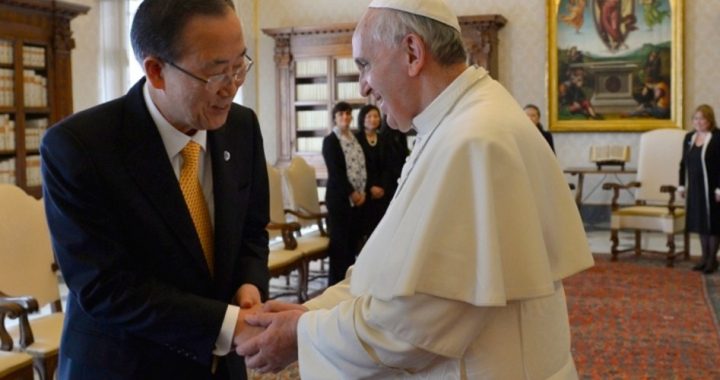
Pope Francis is convening a landmark climate change conference April 28 in Vatican City. Entitled “Protect the Earth, Dignify Humanity: The Moral Dimensions of Climate Change and Sustainable Development,” the meeting will feature an opening address by UN Secretary-General Ban Ki-moon (shown with the pope in 2013) as well as statements and panel discussions involving 60 world religious leaders and scientists. The day-long event is sponsored by the Pontifical Academies of Sciences and Social Sciences, the UN’s Sustainable Development Solutions Network, and Religions for Peace, a non-governmental organization (NGO) headquartered at the United Nations in New York City.
Bishop Sanchez Sorondo, chancellor of the Pontifical Academies of Sciences and Social Sciences, told the Catholic aid agency CAFOD that the pope hopes to influence the UN’s climate change talks scheduled to begin this November in Paris. “The idea is to convene a meeting with leaders of the main religions to make all people aware of the state of our climate and the tragedy of social exclusion,” Sorondo explained.
Apparently, social exclusion ceases to be a tragedy when applied to the tens of thousands of prestigious scientists worldwide who reject the notion that humans are disrupting Earth’s climate and destroying the global environment. None of them are slated for the pope’s conference. Instead, the speakers list is limited to eco-cheerleaders such as American economist Jeffrey Sachs, who directs the Earth Institute at Columbia University, and University of California professor Veerabhadran Ramanathan, who has called global warming “the most important environmental issue facing the world today.”
So it should be fairly easy for Francis to influence climate alarmists in Paris next fall. According to the Vatican announcement, however, there is much more at stake.
The goal of this summit is to raise awareness and build a consensus that the values of sustainable development cohere with values of the leading religious traditions, with a special focus on the most vulnerable; to elevate the debate on the moral dimensions of protecting the environment in advance of the papal encyclical; and to help build a global movement across all religions for sustainable development and climate change throughout 2015 and beyond.
At the conclusion of the conference, attendees plan to issue a joint statement regarding mankind’s supposed moral obligation to environmentalism.
The much-anticipated papal encyclical referred to in the announcement will be the second of Francis’ papacy and his first on the environment. He has been planning it for more than a year, and judging from the pope’s track record, it promises to raise environmentalism to the realm of moral virtue. Last July he told an audience at the Italian university of Molise, “This is our sin: exploiting the Earth,” while in November 2013, he published an apostolic exhortation that an economy based on such exploitation violates the fifth commandment, “Thou shalt not kill.” One wonders if the pontiff will soon require his flock to confess sins like climate change denial, failure to recycle, or opting for an SUV over a Prius. For a man who has declared himself unfit to judge the moral standing of sodomites, is it not ironic that he deems himself the arbiter of your carbon footprint?
Yet while some call Pope Francis’ environmentalism radical, it was actually his predecessor, Benedict XVI, who earned the appellation “The Green Pope,” driving around in an electric Popemobile and earning the 2008 Euro Solar Prize for blanketing the Vatican in solar panels. However, environmentalism was just one item on the previous pontiff’s leftist agenda. He published a 2009 encyclical which calls for a reform and integration of the United Nations and international financial institutions so they could “acquire real teeth,” to “manage the global economy,” to “bring about integral and timely disarmament,” and to “guarantee the protection of the environment,” among a long list of other collectivist goals. “For all this, there is urgent need of a true world political authority, as my predecessor Blessed John XXIII indicated some years ago,” Benedict wrote.
Quite some years ago, in fact. Pope John XXIII reigned from 1958 until his death in 1963. His successor, Paul VI (1963-1978), also called for “the construction of a new world order” that would enjoy “ever growing authority,” in his 1967 encyclical Populorum Progressio. “New world order” became the catchphrase of the more than quarter-century reign of the next pope, John Paul II.
Advancing left-wing ideology under the guise of Catholic theology has apparently been the Vatican vogue for nearly 60 years, and like his predecessors, Pope Francis hasn’t limited his collectivist rhetoric to the environment. From denouncing free-market capitalism to calling for a one world religion and social justice by means of intrusive government expansion, Francis is doing much to merit the title “New World Pope” that Time magazine bestowed on him in 2013.
Meanwhile the pope’s environmental campaign is causing some to question his church’s status in relation to the United Nations. “Is the Church becoming an NGO under Pope Francis?” asks Christopher Ferrara, president of the American Catholic Lawyers Association. Writing for Fatima Perspectives, he pointed out that Francis made the distinction during a recent press conference that “when a part of the Church becomes worldly, it becomes an NGO and ceases to be the Church.” Ferrara explains:
The protection of the environment from abuse by industry and others who would exploit it without regard to the common good is a legitimate role of government, subject to what [Pope] Pius XI called the principle of subsidiary function – that the lowest possible level of government should address government’s legitimate concerns. That is the business of government, however, not the Church.
Ferrara says Francis’ green agenda makes it appear to the world that the Catholic Church “cares more about saving the rain forests than it does about saving souls.”
Photo of Pope Francis greeting UN Secretary-General Ban Ki-moon at the Vatican, April 9, 2013: AP Images



